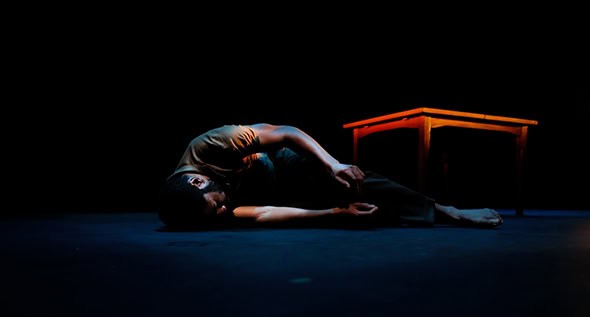Body Politic’s Father Figurine at The Wardrobe Theatre
Posted: September 22nd, 2019 | Author: Ian Abbott | Filed under: Performance | Tags: Body Politic, Derek Mok, Emma-Jane Greig, Father Figurine, Hip Hop, Isaac Oura-Gnao, Joseph Toonga, Lanre Malaolu, Stephen Brown, Tyrone Isaac-Stuart | Comments Off on Body Politic’s Father Figurine at The Wardrobe TheatreBody Politic’s Father Figurine at The Wardrobe Theatre, Bristol, September 13

“Then John knew that a curse was renewed from moment to moment, from father to son. Time was indifferent, like snow and ice; but the heart, crazed wanderer in the driving waste, carried the curse forever.” – James Baldwin
Body Politic’s Father Figurine should be celebrated as one of the first full-length Hip Hop theatre works from a Hip Hop company based outside London that has multiple tour dates across southern England. Based in Oxford, Body Politic’s artistic director Emma-Jane Greig describes Father Figurine as a work that attempts to ‘question the stigmas around the mental health of men and boys whilst combining poignant spoken word poetry with hip hop dance, to explore the fractured relationship between a father and his son and their inability to healthily deal with a traumatic event’.
In Tyrone Isaac-Stuart’s father and Isaac Ouro-Gnao’s son, we have two eminently watchable and skilled Hip Hop technicians. Oura-Gnao transforms, shrinks and takes up less space in the first 20 minutes with his physical mannerisms and facial mimicry that bring to the fore a sense of a six- or seven-year old boy (not his college playing age) idolising his father, whilst Isaac-Stuart broods, blunts and isolates himself from all things in his orbit.
Marked in repetitive chapters, we see the rhythm of time in the familial home, life played out in silent plates for breakfast, crumpled table mats for dinner and strangled conversation before bed; to see the chasm develop between the desire for proximity in Oura-Gnao and the emotional distance of Isaac-Stuart is painful. There is something in Father Figurine that has echoes of a Pinter and Beckett sensibility; not in the language or writing but in the way we are presented with a menace and memory whilst anchored in their world replete with pauses, awkward beats and ghost lives repeated. The most successful moments come when the two characters retire to their rooms at night; visited by the paroxysms of trauma, they assume a yoga-like boat pose that teeters and convulses in sharp, unsettled isolations. Isaac-Stuart’s use of popping and animation as choreographic languages on the floor and standing is both fitting (in the isolation of his body/mind in the work) and delicious.
The physical language and monosyllabic dialogue has a clarity that negates the need for the monologues; when each character burps these uncharacteristically poetic soliloquies it completely jars with the emotional investment and integrity that has been so carefully built up until this point. The writing feels a little indulgent and out of place — not to say it’s not eloquent, but it’s totally ill-fitting. Likewise, the inclusion in the soundtrack of quotes and testimonies from other men who are encountering mental health issues feels a little forced and obvious.
With Stephen Brown and Derek Mok credited for the choreography, it was interesting to hear in the post-show conversation that Brown and Mok were responsible for the original version presented at Resolution 2018 (‘which was essentially the last 20 minutes of the current version’) and have had no input since. It has been Isaac-Stuart and Ouro-Gnao who have built backwards from that point and harvested a movement language from the original source; it feels like they should both have a credit for the work they’ve done on extrapolating the choreographic world.
Father Figurine feels closer to a family portrait than a work that questions the stigma around mental health; it’s a good addition to the number of other one/two person Hip Hop theatre works currently on tour, like Elephant in the Room by Lanre Malaolu and Born to Manifest by Joseph Toonga, that are looking at mental health, lived experiences and the representation of black male relationships.
“Nobody wins when the family feuds.” – Jay Z